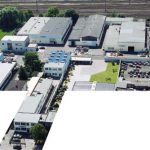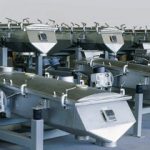The past 50 years have seen a small workshop in Offenbach evolve into an internationally operating corporation: Vibra Maschinenfabrik Schultheis GmbH & Co. This medium-sized company manufactures vibratory machines for mechanical and thermal processes. cav recently paid a visit to the firm and spoke to Wilhelm Schultheis, the Managing Director.
On October 23rd this year, Vibra Maschinenfabrik Schultheis GmbH & Co. celebrated the 50th anniversary of its foundation. In addition to the actual staff, various customers, suppliers and representatives of academic and public life were invited to attend the ceremony, which was followed by a tour of the plant and a formal evening event.
Success with industrial plant engineering
Vibra is a family-owned company with a financially sound basis and an international reputation. It employs a total staff of 111 at its two production locations in Offenbach and in Utzberg, near Weimar. In 1997, this medium-sized firm, which is specialised in industrial plant engineering, achieved a turnover of around DM 20 million. Roughly 60% of its products are sold within Germany, while 30% are exported directly and 10% indirectly. In view of the current financial crisis in Asia, Wilhelm Schultheis, Vibra’s Managing Director, expects the increase in turnover to be lower in 1998 than for the previous years. It is likely to be in the region of 5%. On the issue of Germany’s status as a production location he has the following to say: „The moderate wage policy that has been practised for several years now will restore Germany’s attractiveness as a production location. We also manufacture components abroad, of course, because it is cheaper to do so – in the Czech Republic and Poland, for instance. However, we have experienced problems with the quality of these products in the past and have no plans to expand our activities there at the present time.“
As a general rule, Vibra endeavours to preserve the maximum possible independence vis-à-vis its suppliers. This is particularly true of the Offenbach location, with its extremely large manufacturing depth. Since 1976, for example, all the required vibration motors have been built on the premises. When asked whether this quest for autonomy still makes in the „just-in-time“ era, Schultheis replies: „I am well aware that there are different opinions on this matter. Since one of our goals is flexibility for the benefit of the customer however, the path we have taken is the right one.“
Vibratory systems for chemicals and pharmaceuticals
Vibra Maschinenfabrik combines two major product areas. The first of these is vibratory systems for mechanical processes. These vibratory machines are used for conveying, screening, compacting, distributing, loosening and removing bulk materials. Schultheis points out that the tensioning system used for the cloths on the screening machines has been improved during the past few years with the aid of compressed-air cylinders. On the one hand, they normally keep the cloth absolutely taut. On the other hand, they also slacken it temporarily, so that it flaps about and can be cleaned more easily. One of the most important applications of screening machines is the production of plastic granules. When the granules are cut, excess lengths may result in defective products during the downstream injection-moulding stage. All excess lengths must therefore be removed. Vibra has developed a special type of cutter for this very purpose. It permits multiple screening of the plastic granules in a confined space, so that products with practically no excess lengths are obtained.
The second of the two product areas concerns fluidised-bed systems for thermal processes, that can be operated either with or without vibration support. Vibra, however, has made vibration-supported, fluidised-bed systems its speciality. Schultheis is quick to emphasise that with vibration support the range of potential applications of his fluidised-bed systems can be widened consider-ably. It extends from simple drying or cooling through instant drying and calcination to roasting. „In addition to these two product areas“, explains Schultheis, „our company also makes mechanical plant equipment. For some years now, particularly on the drying technology side, it has been our policy not just to offer the individual vibration cells. If the customer so wishes, we can also sell him the complete plant for a whole process chain. We supply both the vibration cell it-self, made in-house, and all the components installed both upstream and downstream of it, including the necessary instrumentation and control. We are also responsible for designing the process engineering side of the entire plant.“
Vibra machines comply with the stringent hygiene requirements of the pharmaceutical and food processing industries. They are also available with explosion-proof drives or in a surge pressure-resistant version for use in the chemical industry. The throughput of the machines varies according to the customer’s specifications; in addition, it depends on the type of bulk material that must be processed, the size of the fluidised bed or the surface area of the screen and the type of process involved. (le)
Vibra Maschinenfabrik
Fax: ++49/69/860003-45
Further information cpp-233
In the 1930s, Wilhelm Schultheis senior, the father of the present Managing Director, founded a small engineering firm in Silesia for building screening machines for the mining, stone and earth-working and sugar-beet processing industries.
Following the war and a period spent in captivity, Schultheis senior settled in his old home town of Offenbach. In 1948, on the day of the currency reform, he opened a small workshop with a staff of three, where he made screening machines for processing gravel. Over the years, the gravel-processing industry gradually demanded larger and more powerful machines. His workshop was eventually too small; in any case, he lacked suitable equipment and tools for building large screening machines. It was against this background that Schultheis senior decided to pursue a new line of business. From then on, he specialised in building smaller screening machines for the chemical industry and for the production of foodstuffs.
In 1951, Vibra moved into a new production shop in Mühlheimer Strasse 243 – still the company’s head office today. The workforce by then numbered around ten. By the early 1960s, the Offenbach firm had established itself with new machines in the chemical and food processing industries. This was also the period when Wilhelm Schultheis, the present Managing Director, joined his father’s firm.
In the late 1960s, many manufacturers of semi-luxury foods began to use freeze-drying as a means of producing instant coffee and tea without forfeiting their aroma. Schultheis recalls: „Manufacturing freeze-drying machines was a fantastic opportunity for us. They represented Vibra’s major breakthrough on the German and international markets. We were the very first to build machines for this purpose. Our machines were used in conveying, grinding and screening lines installed in a cold room at -50 °C. The individual components were actually already available. The challenge was to combine them in a single machine and then to adapt this machine to the conditions prevalent in the cold room.“
During the years that followed, Vibra developed and manufactured resonant vibratory conveyors, resonant fluidised-bed dryers with working surfaces up to 10 m² in size, multi-functional apparatus, vibratory hopper conveyors with pressure-resistant heat exchanger ends and pharmaceutical screening machines that worked inside a pressure chamber. The most recent products on the market are resonant, vibrating conveyor dryers with a working surface of around 25 m².
Economic success, and above all the continuous broadening of its product range, have enabled Vibra to gradually increase the size of its production plants and its stock of machinery. Schultheis is proud of his company’s particularly modern facilities for sheet metalworking. Furthermore, all process and vibra-tion tests are now conducted in a new physical laboratory opened three years ago.
In view of the limited potential for expansion in Offenbach, a decision was taken in 1992 to build a new production plant in Utzberg, near Weimar. According to Schultheis, „This manufacturing location is strategically important to us. When the economy in East Germany and Eastern Europe eventually starts to boom, we will have sufficient land in reserve there to erect new production plants.“
Unsere Webinar-Empfehlung
Die Websession „Wasserstoff in der Chemie – Anlagen, Komponenten, Dienstleistungen“ (hier als Webcast abrufbar) zeigt technische Lösungen auf, die die Herstellung und Handhabung von Wasserstoff in der chemischen Industrie sicher machen und wirtschaftlich gestalten.
Ob effizienter…
Teilen:













